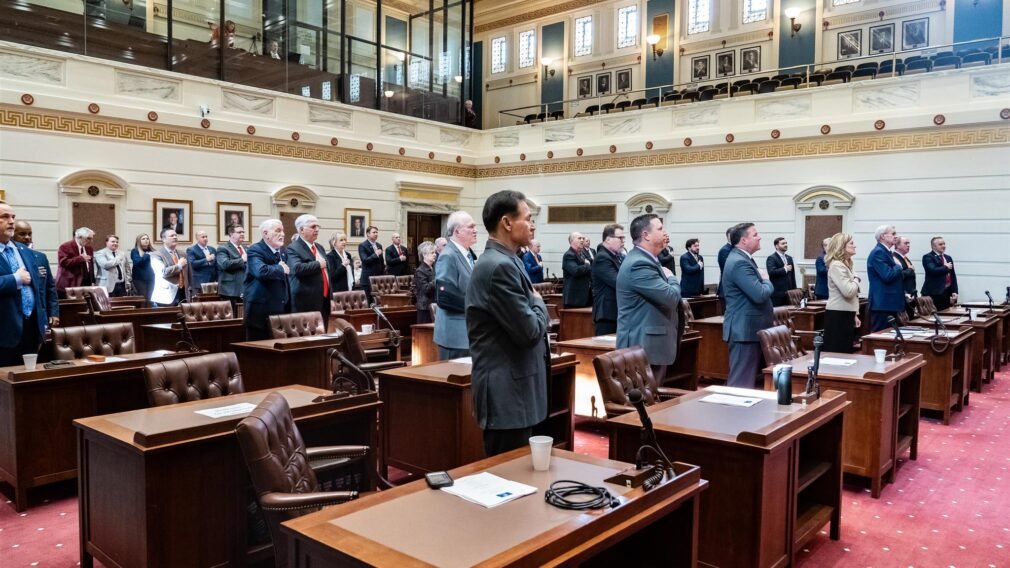Oklahoma’s Sports Betting Hopes Crash in 2025
Oklahoma’s 2025 push to legalize sports betting ended, as the Senate adjourned without voting on House-approved bills, keeping the state among the few without legal sportsbooks.

A Legislative Dead End
Oklahoma’s bid to join the 38 states (+DC) with legal sports betting fizzled out when the Senate adjourned without acting on two House-approved bills, HB 1047 and HB 1101, or the Senate’s SB 585, known as the “Thunder Bill.” The deadline for third readings in the legislative session passed, killing any chance of legalization in 2025.
The failure stemmed from a deep divide among lawmakers, Oklahoma’s 38 federally recognized tribes, and Governor Kevin Stitt, who vowed to veto tribal-exclusive bills.
Despite earlier momentum, with HB 1047 and HB 1101 passing the House in March and SB 585 clearing the Senate, the lack of consensus on market structure, tribal exclusivity versus open competition, halted progress. Oklahoma remains one of 11 states without legal sports betting.
The Bills That Fell Short
Rep. Ken Luttrell’s HB 1047 aimed to amend tribal gaming compacts, allowing Oklahoma’s tribes to offer in-person and online sports betting on tribal lands, with a 10% state fee on adjusted gross revenue.
HB 1101 mirrored it but included a backup plan: if HB 1047 failed or faced Stitt’s veto, a 2026 voter referendum would decide. “These bills represent a balanced approach,” Luttrell said, estimating $14 million to $42 million in annual state revenue.
Both passed the House and the Senate Business and Commerce Committee but stalled before a Senate floor vote. Sen. Bill Coleman’s SB 585, the “Thunder Bill,” proposed a hybrid model, letting tribes handle betting on their lands while granting the Oklahoma City Thunder a license to sublicense mobile and in-person betting off tribal lands.
It passed the Senate 25-15 after a rocky vote but was pulled from the House Appropriations and Budget Committee by Coleman, citing insufficient support. “Oklahoma is missing out on a significant opportunity,” Coleman said.
The Core Conflict: Tribes vs. Free Market
The impasse hinged on a fundamental disagreement over market control. Luttrell’s bills prioritized tribal exclusivity, aligning with Oklahoma’s gaming compacts, which grant tribes sole rights to Class III gaming like slots and roulette for exclusivity fees: $210 million in 2024 alone.
Tribes, via the Oklahoma Indian Gaming Association (OIGA), backed this model, fearing Stitt’s plan would erode their $200 million annual education contributions.
Stitt, however, pushed a free-market approach, proposing competitive licenses for tribes, the Thunder, or commercial operators like DraftKings, with a $500,000 fee, 15% tax on retail, and 20% on mobile betting.
“We need more of a free market accountable system,” Stitt said, criticizing tribal exclusivity as a monopoly. He felt excluded from talks, stating, “They’ve excluded the governor from these discussions.”
The OIGA called Stitt’s plan a “nonstarter,” and no Thunder-tribe meeting materialized, sinking SB 585.
Stakeholder Frictions and Missed Chances
Tensions ran high. Stitt’s rocky history with tribes, including a 2020 failed compact attempt ruled illegal, fueled distrust. “The biggest challenge has been a lack of communication,” Coleman said, noting no stakeholders sat down together.
House Speaker Kyle Hilbert warned Stitt’s plan could jeopardize compacts, saying, “I can’t see a solution without working with our tribal partners.”
The Thunder Bill’s withdrawal highlighted the gap: tribes saw it as breaching exclusivity, while Stitt opposed any tribal monopoly. Even HB 1101’s referendum option, a tactic used for the 2003 Oklahoma Lottery, couldn’t bridge the divide, as Senate inaction blocked both bills.
Analysts estimated a $20 million annual state loss, with bettors likely turning to illegal or out-of-state platforms.
While 2025 hopes are dead, the issue isn’t buried. Sen. Coleman plans summer interim studies to unite stakeholders, saying, “We need to build it together.”
Recommended
